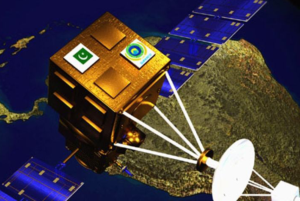
Pakistan’s first high-resolution Earth observation satellite, the Pakistan Remote Sensing Satellite (PRSS) 1, and the country’s first indigenously built test satellite, PakTES-1A, were successfully launched from China’s Jiuquan Satellite Launch Centre on the morning of Monday, 9 July 2018, on board a Long March-2C satellite launch vehicle.
PRSS-1 was built for Pakistan by the China Academy of Space Technology (CAST) and is the 17th such Satellite developed by the organisation for a foreign country. PRSS-1 will be used for land and resource management, urban development, environmental monitoring, and Pakistani national security purposes, as well as used in support of the construction and operation of the China-Pakistan Economic Corridor (CPEC), part of China’s ambitious Belt and Road Initiative (BRI).
PakTES-1A is an experimental test satellite developed indigenously by scientists and engineers at the Pakistani space agency, the Space and Upper Atmosphere Research Commission (SUPARCO). The purpose of the PakTES-1A satellite is to indigenously develop the technical capacities, methods, processes, and technologies required for Pakistan to indigenously build its own high-capability satellites in the future.
Writing on Twitter and Facebook, former Pakistani Interior and Planning Minister Ahsan Iqbal said, “Another dream comes true. In 2016, I had the honour of signing agreement for developing and launching Pakistan’s first remote sensing satellite PRSS-1 between Pakistan & China. Today two satellites PRSS-1 and PakTES-1A have been successfully launched from Jiuquan Launch Centre, China marking yet another high between China & Pakistan’s iron friendship in the field of scientific cooperation and taking this relation to higher than skies. PakTES-1A is indigenously developed by SUPARCO engineers & scientists. I congratulate the nation and SUPARCO team on achieving this milestone. IA Pakistan will soon have capability to launch satellites from its own space centre.”





